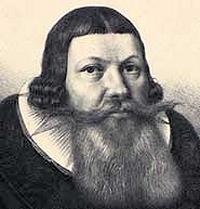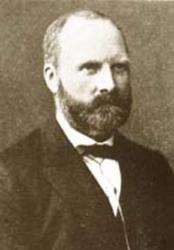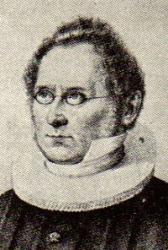Planning worship?
Check out our sister site, ZeteoSearch.org,
for 20+ additional resources related to your search.
- |
User Links
Person Results
N. F. S. Grundtvig

1783 - 1872 Person Name: Grundtvig Topics: Anden Paaskedag Til Høimesse -Til Anden Tekstrækkes Evangelium Author of "Paaske-Morgen slukker Sorgen" in Salmebog for Lutherske Kristne i Amerika Nicolai Frederik Severin Grundtvig was the son of a pastor, and was born at Udby, in Seeland, in 1783. He studied in the University of Copenhagen from 1800-1805; and, like some other eminent men, did not greatly distinguish himself; his mind was too active and his imagination too versatile to bear the restraint of the academic course. After leaving the university he took to teaching; first in Langeland, then (1808) in Copenhagen. Here he devoted his attention to poetry, literature, and Northern antiquities. In 1810 he became assistant to his father in a parish in Jutland. The sermon he preached at his ordination, on the subject "Why has the Lord's word disappeared from His house," attracted much attention, which is rarely the case with "probationers'" sermons. On his father's death, in 1813, he returned to Copenhagen, and for eight years devoted himself mainly to literature. The poetry, both secular and religious, that he produced, drew from a friend the remark that "Kingo's harp had been strung afresh." In 1821 King Frederik vi. appointed him pastor of Prasloe, a parish in Seeland, from which he was the next year removed to Copenhagen, and made chaplain of St. Saviour's church in Christianshavn. From the time of his ordination he had been deeply impressed with Evangelical church sentiments, in opposition to the fashionable Rationalism and Erastianism of the day; and adhered to the anti-rationalist teaching of Hauge, whose death at this time (1824) seemed to be a call to Grundtvig to lift up his voice. An opportunity soon presented itself; Professor Clausen brought out a book entitled Katholicismens og Protestantismens Forfatning, Ldre, og Ritus ("The condition, teaching, and ritual of Catholicism and Protestantism"). This book was replete with the Erastian Rationalism which was so especially distasteful to Grundtvig, who forthwith, in his Kirkens Gjenmsele ("The Church's Reply," 1825), strongly opposed its teaching, and laid down truer principles of Christian belief, and sounder views of the nature of the Church. This caused a sensation: Grandtvig (who had not spared his opponent) was fined 100 rixdollars, and the songs and hymns which he had written for the coming celebration of the tenth centenary of Northern Christianity were forbidden to be used. On this he resigned his post at St. Saviour's, or rather was forced to quit it by a sentence of suspension which was pronounced in 1826, and under which he was kept for 13 years. He took the opportunity of visiting England in 1829, 30, and 31, and consulting its libraries, mainly with a view to a further insight into Northern antiquities, and to help his studies in the early English tongue. His edition of Cynewulfs beautiful poem of the Phenix from the Codex Exoniensis, the Anglo-Saxon (so-called) text, with a preface in Danish, and a fri Fordanskning (free rendering in Danish), published in 1840*, is a result of this journey and enforced leisure. Tired of his long silence, his numerous friends and admirers proposed to erect a church for him, and form themselves into an independent congregation, but this was not permitted. He was allowed, however, to hold an afternoon service in the German church at Christianshavn. There ho preached for eight years, and compiled and wrote his hymn-book, Sang-Vdrk til den Danske Kirkce ("Song-work for the Danish Church"). He still worked on towards his object of raising the Christian body to which ho belonged from the condition of a mere slate establishment to the dignity of a gospel-teaching national church. In 1839 (the year of the death of King Frederik vr., and the accession of his cousin Chrisliem vni.) the suspension was removed, and he was appointed chaplain of the hospital Vartou, a position which he held till his death. In 1863 the king (Frederik vn.) conferred on him the honorary title of bishop. The good old man died suddenly, in his 89th year, on Sept. 2, 1872, having officiated the day before. As Kingo is the poet of Easter, and Brorson of Christmas, so Grundtvig is spoken of as the poet of Whitsuntide.
--John Julian, Dictionary of Hymnology,, p. 1001 (1907)
N. F. S. Grundtvig
Anonymous
Person Name: Ukj. Topics: Anden Paaskedag Til Aftensang Author of "I prægtige Himle og Jorden tillige" in M. B. Landstads Kirkesalmebog og "Nokre Salmar" ved Professor Dr. E. Blix, samt følgende tillæg In some hymnals, the editors noted that a hymn's author is unknown to them, and so this artificial "person" entry is used to reflect that fact. Obviously, the hymns attributed to "Author Unknown" "Unknown" or "Anonymous" could have been written by many people over a span of many centuries.
Anonymous
Anders Christensen Arrebo

1587 - 1637 Person Name: Anders Arrebo Topics: Anden Paaskedag Til Høimesse -Til Tredje Teksxtækkes Evangelium; Første Paaskedag Til Aftengudstjeneste - Til Anden Tekstrækkes Epistel; Anden Paaskedag Til Aftengudstjeneste Author of "Om Salighed og Glæde" in Salmebog for Lutherske Kristne i Amerika
Anders Christensen Arrebo
Hans Adolf Brorson

1694 - 1764 Person Name: Brorson Topics: Anden Paaskedag Til Aftengudstjeneste - Til Anden Tekstrækkes Epistel; Anden Paaskedag Til Høimesse -Til Tredje Teksxtækkes Evangelium; Anden Paaskedag Til Aftengudstjeneste Author of "Stat op at møde " in Salmebog for Lutherske Kristne i Amerika
Hans Adolf Brorson
Thomas Kingo

1634 - 1703 Person Name: Kingo Topics: Anden Paaskedag Til Høimesse Author of "Hvor lifligt er det dog at gaa" in Salmebog for Lutherske Kristne i Amerika
Thomas Kingo
Karl August Döring
1783 - 1844 Person Name: Karl Døring Topics: Anden Paaskedag Til Aftengudstjeneste - Til Tredje Tekstrækkes Epistel; Anden Paaskedag Til Aftengudstjeneste Author (v. 1-5) of "Lover den Herre, hvis reddende Kjærlighed sender" in Salmebog for Lutherske Kristne i Amerika Döring, Carl August, son of B. L. Döring, chief forester at Mark-Alvensleben, near Magdeburg, was born at Mark-Alvensleben, Jan. 22, 1783. After completing his studies at the University of Halle, he was for some time private tutor at Waldenburg, in Silesia. In 1808 he was appointed a master in the school at Kloster-Bergen, near Magdeburg; and after its dissolution by Napoleon in 1810, acted for some time as a private tutor at Helmsdorf, near Eisleben. He was, in 1814, appointed afternoon preacher at St. Peter's Church, Magdeburg; in 1815 Archidiaconus of St. Andrew's Church at Eisleben; and in 1816 Pastor of the Lutheran Church at Elberfeld. He died at Elberfeld, Jan 17, 1844 (Koch, vii. 159-168; Allg. Deutsche Biog. , v. 348-349).
One of the most prolific of German hymnwriters, he produced some 1200 hymns, not a few of which have passed into use in Germany through the Berlin Gesang-Buchem, 1829, the Nassau Gesang-Buch, 1844, and other collections. They appeared mostly in his Christliches Hausgesangbuch. Of this pt. i was published at Elberfeld, 1821, with 515 hymns by himself, and 169 by others; the 2nd edition, Elberfeld, 1825, omitting those by other authors, and increasing his own to 630. Part ii was published at Elberfeld, 1830, with 551 hymns. Three have been translated:—
i. Ich weiss, dass mein Erlöser lebt, Er ward ja schon mein Leben! [Easter.] 1821, as above, No. 100, in 6 stansas, translated as “I know that my Redeemer lives; He is my life already," by N. L. Frothingham, 1870, p. 157.
ii. Vater, Sohn and heil'ger Geist. [Confirmation.] 1821, as above (No. 546), as a hymn for Confirmation. It is in 15 stanzas of various metres, st. i.-iii. being marked as to be sung by the congregation on behalf of the children; stanzas viii.-xiii. as a hymn of supplication by the children; stanzas iv.-vii. by the parents and teachers; and stanzas xiv.-xv., by the congregation as a general supplication. Two parts are in German common use, viz. stanzas i.-iii. as Rin Bunsen's Versuch, 1833, No. 614, beginning, "Segne, Vater, Sohn und Geist," as in Döring's edition 1825, No. 502; and stanzas viii.-xiii., beginning, "Wir flehn um deine Gnade," in Bunsen, No. 615, the Hamburg Gesang-Buch, 1842, No. 276, and many recent collections. The only translation in common use is—
Father, Son and Holy Ghost, Bless the Young. A good translation of stanzas i.-iii. by J. S. Stallybrass, in the Tonic Sol-fa Reporter, January, 1859, and thence, as No. 329, in the Scottish Presbyterian Hymnal, 1876.
iii. Taufe mich mit deiner Taufe, [Whitsuntide.] 1821, as above, No. 135, in 4 stanzas. It is translated as "With other baptism, Lord, baptise," by Dr. G. Walker, 1860, p. 66. [Rev. James Mearns, M.A.]
-- John Julian, Dictionary of Hymnology (1907)
Karl August Döring
M. B. Landstad

1802 - 1880 Person Name: Landstad Topics: Anden Paaskedag Til Aftengudstjeneste - Til Tredje Tekstrækkes Epistel; Anden Paaskedag Til Aftengudstjeneste Author (v. 6) of "Lover den Herre, hvis reddende Kjærlighed sender" in Salmebog for Lutherske Kristne i Amerika Magnus Brostrup Landstad (born 7 October 1802 in Måsøy, Norway and died 8 October 1880 in Kristiania) was a Norwegian minister, psalmist and poet who published the first collection of authentic Norwegian traditional ballads in 1853. This work was criticized for unscientific methods, but today it is commonly accepted that he contributed significantly to the preservation of the traditional ballads.
Landstad lived with his father Hans Landstad (1771–1838) who was also a minister, first in 1806 to Øksnes, to Vinje in 1811 and to Seljord in 1819. He took a theological degree (cand. theol) in 1827, and worked after that as the resident chaplain in Gausdal for six years. After that he worked in different parishes in Telemark, Østfold before he became minister of Sandar in Vestfold in 1859. He married Wilhelmine Margrete Marie Lassen, in 1828. He is well known for introducing popular, contemporary Norwegian language into the hymns he wrote, contributing significantly to the spirit of Norwegian romantic nationalism which grew in Norway in this period.
His greatest single achievement was the Landstad Hymnbook (Kirkepsalmebog), which with later revisions was used in Norwegian (bokmål) parishes from 1869 until 1985. The current official church hymnbook contains a lot of his hymns and his translations of foreign hymns.
He was the cousin of Hans Peter Schnitler Krag.
The Landstad-institute, which lies in Seljord, is named after him.
He was a great grandfather of Magny Landstad, also a famous writer.
Publications--
1852: Norske Folkeviser. 3 vols. Christiania: C. Tönsberg, [1852-]1853.
1869: Kirkesalmebok: efter offentlig Foranstaltning. Kristiania: J. W. Cappelens Forlag, 1871
--http://en.wikipedia.org/wiki/
See also in:
Wikipedia
M. B. Landstad
Ludvig Mathias Lindeman

1812 - 1887 Person Name: Ludv. M. Lindeman Topics: Anden Paaskedag Til Aftensang Composer of "[I prægtige Himle og Jorden tillige]" in M. B. Landstads Kirkesalmebog og "Nokre Salmar" ved Professor Dr. E. Blix, samt følgende tillæg Ludvig M. Lindeman (b. 1812; d. 1887) was a Norwegian composer and organist. Born in Trondheim, he studied theology in Oslo where he remained the rest of his life. In 1839 he succeeded his brother as the organist and cantor of Oslo Cathedral, a position he held for 48 years up until his death. Lindeman was appointed Knight of the Royal Norwegian Order of St. Olav, and was invited to both help christen the new organ in Royal Albert Hall in London, as well as compose for the coronation of King Oscar II and Queen Sophie of Sweden. In 1883, he and his son started the Organist School in Oslo. Lindeman is perhaps best known for his arrangements of Norwegiam folk tales; over the course of his life he collected over 3000 folk melodies and tunes.
Laura de Jong
Ludvig Mathias Lindeman
Elias Blix

1836 - 1902 Person Name: Blix Topics: Anden Paaskedag Til Aftensang Author of "I Edens sæle Sumar" in M. B. Landstads Kirkesalmebog og "Nokre Salmar" ved Professor Dr. E. Blix, samt følgende tillæg
Elias Blix
C. J. Boye

1791 - 1853 Person Name: Caspar Boye Topics: Anden Paaskedag Til Høimesse Author of "Bliv hos os, Mester, Dagen helder!" in Salmebog for Lutherske Kristne i Amerika Caspar Johannes Boye was born in Kongsberg, Norway in 1791. He studied both law and theology at the University of Copenhagen, became a teacher and later served as rector in Søllerød, Helsingørand and Copenhagen. He died in 1853.
See also in:
Wikipedia
C. J. Boye


 My Starred Hymns
My Starred Hymns


